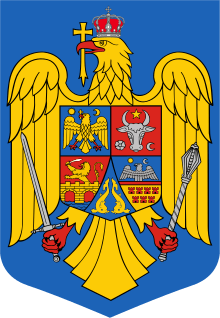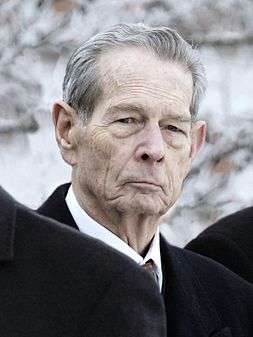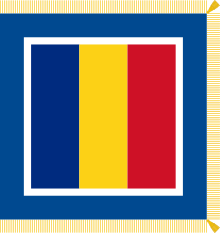President of Romania
| President of Romania
Președintele României | |
|---|---|
|
| |
| Residence | Cotroceni Palace |
| Appointer | Popular vote |
| Term length | Five years, renewable once |
| Inaugural holder | Nicolae Ceaușescu |
| Formation | 28 March 1974 |
| Salary | 15,108 lei per month[1] |
| Website | Președintele României |
 |
| This article is part of a series on the politics and government of Romania |
|
The President of Romania is the head of state of Romania. The President is directly elected by a two-round system for a five-year term (since 2004, after the Constitution was modified in 2003). An individual may serve two terms. During his/her term in office, the President may not be a member of any political party.
The office of President was created in 1974, when Communist leader Nicolae Ceaușescu elevated the presidency of the State Council to a full-fledged executive presidency. It gradually took its current form in stages after the Romanian Revolution, culminating with the adoption of Romania's current constitution in 1991.
The current President of Romania is Klaus Iohannis, since 21 December 2014.
Communist era
In the Communist era, the president was elected for a term of five years by the Great National Assembly, with no term limits. He served as ex officio president of the State Council, and had the right to act on any matter that didn't require a State Council plenum. He also appointed and dismissed ministers and heads of central agencies. When the GNA was not in session, the president could appoint and dismiss the president of the Supreme Court and the prosecutor general without State Council approval; indeed, he was not even required to consult his State Council colleagues when making such decisions. Ceaușescu created the post in order to make himself chief decision-maker in both name and in fact. Previously, he had nominally been first among equals on the State Council, deriving his real power from his post as leader of the Romanian Communist Party. In practice, he used his power to act on all matters that didn't require a plenum to rule by decree, and frequently usurped many powers that belonged to the State Council as a whole.[2]
Oath of office
After the Constitutional Court acknowledges the legality of the election, the Houses of Parliament meet in a joint session. The elected President takes the following oath of office, specified by article 82 of the Constitution:
Romanian: Jur să-mi dăruiesc toată puterea și priceperea pentru propășirea spirituală și materială a poporului român, să respect Constituția și legile țării, să apăr democrația, drepturile și libertățile fundamentale ale cetățenilor, suveranitatea, independența, unitatea și integritatea teritorială a României. Așa să-mi ajute Dumnezeu!
English: I solemnly swear that I will dedicate all my strength and the best of my ability for the spiritual and material welfare of the Romanian people, to abide by the Constitution and laws of the country, to defend democracy, the fundamental rights and freedoms of my fellow-citizens, Romania's sovereignty, independence, unity and territorial integrity. So help me God! [3]
Powers and duties
The prerogatives of the President of Romania are set out in Title II, Chapter III of the Constitution.[4]
In internal affairs:
- Representing the Romanian State and safeguarding of the national independence, unity and territorial integrity of the country.
- Guarding the observance of the Constitution and the functioning of public authorities.
- Designating and appointing the Prime Minister, subject to parliamentary approval (The President cannot dismiss the Prime Minister.).
- Appointing and removing ministers, on the proposal of the Prime Minister (a ministerial appointment may be rejected only once).
- Consulting the Government on major policy matters.
- Presiding the meetings of the Government debating upon matters of national interest with regard to foreign policy, the defence of the country, insurance of public order, and, at the Prime Minister's request, in other instances as well.
- Addressing messages to Parliament on issues of national interest.
- Promulgating bills (they may be referred back to Parliament only once, for reconsideration).
- Summoning the Houses of Parliament after a legislative election.[5]
- Requesting the convocation of an extraordinary session of Parliament.[6]
- Dissolving Parliament (The President may dissolve Parliament if no vote of confidence has been obtained to form a government within 60 days after the first request was made, and only after rejection of at least two requests for investiture.).
- Calling referendums (after consultation with Parliament).
In foreign affairs:
- Concluding international treaties negotiated by the Government and submitting them to Parliament for ratification.
- On proposal by the Government, accrediting and recalling diplomatic envoys.
- Receiving letters of credence from foreign diplomatic envoys .
- Approving the setting up, closing down or change in rank of diplomatic missions.
In defence issues:
- Exerting the role of Supreme Commander of the Armed Forces.
- Presiding over the Supreme Council of National Defence.
- Declaring mobilisation of the Armed Forces, subject to prior approval of Parliament (or, in special circumstances, subsequent approval).
- Taking measures to repel armed aggression towards the country.
- Instituting the state of siege or the state of emergency (nationally or locally, with subsequent parliamentary approval).
Other duties:
- Conferring decorations and titles of honour.
- Making promotions to superior military ranks.
- Making appointments to public offices as provided by law.
- Granting individual pardons.
In the exercise of his functions, the President issues decrees which are obligatory in the country. The decrees issued by the President of Romania in the exercise of his powers, as provided under Article 91 paragraphs (1) and (2), Article 92 paragraphs (2) and (3), Article 93 paragraph (1), and Article 94 subparagraphs a), b) and d) must be countersigned by the Prime Minister in order to take effect.
Impeachment
An incumbent President who severely violates the Constitution may be suspended by the Parliament in joint session. If the suspension motion passes, there is a call for a referendum of impeachment within no more than 30 days from the suspension.
If the Senate and Chamber of Deputies, in joint session, accuse the President of high treason, the President is suspended from powers and duties by right. The accusations are judged by the High Court of Cassation and Justice. The incumbent President is dismissed by right if found guilty of high treason.
History
The suspension and impeachment procedure has been implemented three times. The first time regarded President Ion Iliescu, following a statement regarding the returning of the illegally confiscated properties during the years of the Socialist Republic of Romania to the original owners or their heirs. This first attempt in 1995 did not pass the vote in Parliament.
The second attempt was successful, with the person suspended being Traian Băsescu, in office as of April 2007. He became the first president to successfully be suspended and also the first to face an impeachment vote before the people, regarding issues with supposed unconstitutional acts. The impeachment plebiscite was held on 19 May 2007, and Băsescu survived the impeachment attempt. The result was the rejection of the proposal by 24.94% in favor to 75.06% opposed.
The third attempt lead to a second successful suspension in July 2012, again against Traian Băsescu. The referendum was held on 29 July 2012, and the results were 88.7% in favor and 11.3% opposed, with voter turnout calculated to be 46.24%; below the 50% + one vote threshold required at the time the referendum was held. The Constitutional Court did not give a verdict on the validation of the referendum at the time, citing irregularities in the permanent electoral lists. On 21 August, the Court deemed the referendum invalid, and again Băsescu prevailed from being ousted.[7]
Succession
| Part of a series on Orders of succession |
| Presidencies |
|---|
Should the office of the President become vacant due to resignation, impeachment, permanent inability to perform the duties of office, or death,[8] the President of the Senate or the President of the Chamber of Deputies, in that order, step in as Ad Interim President of Romania[9] (Romanian: Președinte Interimar al României). Neither relinquish their position as President of their respective Legislative House for the duration of the Ad Interim term. An Ad Interim President cannot address the Parliament, dissolve the Parliament, nor call for a referendum (the impeachment referendum after a motion of suspension is called by Parliament). The vacancy of the office cannot be longer than three months.[10] While the President is suspended, the office is not considered vacant.
List
Latest election
| Candidates | First round | Runoff | ||||
|---|---|---|---|---|---|---|
| Candidate | Sustaining alliance or party | Votes | % | Votes | % | |
| Klaus Iohannis | Christian Liberal Alliance (PNL–PDL) | 2,881,406 | 30.37% | 6,288,769 | 54.43% | |
| Victor Ponta | PSD–UNPR–PC Alliance[a] | 3,836,093 | 40.44% | 5,264,383 | 45.56% | |
| Călin Popescu-Tăriceanu | Independent[b] | 508,572 | 5.36% | | ||
| Elena Udrea | PMP–PNȚCD Alliance | 493,376 | 5.20% | |||
| Monica Macovei | Independent | 421,648 | 4.44% | |||
| Dan Diaconescu | People's Party – Dan Diaconescu | 382,526 | 4.03% | |||
| Corneliu Vadim Tudor | Greater Romania Party | 349,416 | 3.68% | |||
| Hunor Kelemen | Democratic Union of Hungarians in Romania | 329,727 | 3.47% | |||
| Teodor Meleșcanu | Independent | 104,131 | 1.09% | |||
| Zsolt Szilágyi | Hungarian People's Party of Transylvania | 53,146 | 0.56% | |||
| Gheorghe Funar | Independent | 45,405 | 0.47% | |||
| William Brînză | Romanian Ecologist Party | 43,194 | 0.45% | |||
| Constantin Rotaru | Socialist Alternative Party | 28,805 | 0.30% | |||
| Mirel Mircea Amariței | PRODEMO Party | 7,895 | 0.08% | |||
| Total valid votes | 9,485,340 | 100.00% | 11,553,152 | 100.00% | ||
| Invalid/blank votes | 237,761 | 2.44% | 166,111 | 1.41% | ||
| Turnout | 9,723,232 | 53.17% | 11,719,344 | 64.10% | ||
| Registered voters | 18,284,066[c] | 18,280,994[c] | ||||
Notes
| ||||||
| Source: Biroul Electoral Central; Biroul Electoral Central; Biroul Electoral Central | ||||||
Living former heads of state
There are three living former Romanian Presidents and one living former King of Romania:

Michael I
(1927-1930/1940-1947)
October 25, 1921Ion Iliescu
(1989-1996/2000-2004)
March 3, 1930
Emil Constantinescu
(1996-2000)
November 19, 1939_(cropped_2).jpg)
Traian Băsescu
(2004-2014)
November 4, 1951
See also
- Lifespan Timeline of Heads of State of Romania
- List of heads of state of Romania
- List of Presidents of Romania by time in office
- Prime Minister of Romania
References
- ↑ "Cat vor castiga Iohannis si Ponta dupa majorarea salariilor demnitarilor". Ziare.com (in Romanian). 8 July 2015.
- ↑ Sergiu Verona. "Government and Politics".
 This article incorporates text from this source, which is in the public domain.
This article incorporates text from this source, which is in the public domain. - ↑ Constitution of 1991, as revised in 2003 "Article 82: Validation of mandate and oath-taking", retrieved on 7 July 2012
- ↑ http://www.cdep.ro/pls/dic/site.page?den=act2_2&par1=3#t3c2
- ↑ Art. 63, (3) of the Constitution
- ↑ Art. 66, (2) of the Constitution
- ↑ "Curtea Constitutionala a invalidat referendumul cu scorul 6-3. Traian Basescu revine la Cotroceni". Retrieved 2012-08-21.
- ↑ Constitution of 1991, as revised in 2003 "Article 97: Vacancy of office", retrieved on 11 April 2010
- ↑ Constitution of 1991, as revised in 2003 "Article 98: Interim of office", retrieved on 11 April 2010
- ↑ Constitution of 1991, as revised in 2003 "Article 97: Vacancy of office; paragraph (2)", retrieved on 22 August 2012
- ↑ http://www.bec2014.ro/wp-content/uploads/2014/11/proces_verbal_PR.pdf
- ↑ http://www.bec2014.ro/rezultate-finale-16-noiemrie

.jpg)